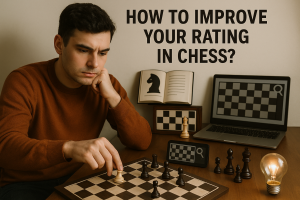A FIDE rating is a numerical measure of a chess player’s skill level, calculated by the International Chess Federation (FIDE) using the Elo rating system. This system assesses a player’s performance in FIDE-rated tournaments and assigns a rating that reflects their relative strength compared to other players.
Players earn their initial FIDE rating by participating in official tournaments and achieving performance benchmarks against rated opponents. The minimum rating awarded is 1000, and as players compete and perform in subsequent games, their rating is adjusted accordingly. Higher ratings indicate stronger players and specific rating thresholds are associated with titles such as Grandmaster (GM), International Master (IM), and FIDE Master (FM).
FIDE ratings are updated monthly and are used to rank players globally, influencing tournament seedings and eligibility for certain competitions.
Whether you’re a rookie trying to understand the basics or a seasoned player aiming for a title, this guide will break down what a FIDE rating in chess truly means and how you can work your way up the rankings.
Table of contents
- Participating in a FIDE-Rated Tournament
- Obtaining a FIDE ID: Your Entry Pass to the Chess World
- Getting a FIDE Rating: Earning Your Place on the Leaderboard
- Details on Receiving and Maintaining FIDE Ratings
- Addressing Rating-Related Issues
- Proposed Changes to the FIDE Rating System
- Implementation Timeline for Rating Changes
- Understanding and Navigating the FIDE Rating System
Participating in a FIDE-Rated Tournament
So, you want to get that all-important FIDE rating? It starts with participating in a FIDE-rated tournament. But these aren’t your casual club games; they’re officially recognized competitions where ratings are earned, titles are fought for, and every move counts.
Organized by Federations or Independent Organizations
Most FIDE-rated tournaments are organized by national chess federations or independent organizations recognized by FIDE. These tournaments are gateways to the world of rated chess. For instance, the United States Chess Federation (USCF) or the European Chess Union (ECU) frequently host such events, giving players the chance to earn or improve their ratings.
The structure and atmosphere of these tournaments often feel like a step up from regular club play. Competitions are held with standardized chess sets, clocks, and formats that ensure every game is played on an even field. It’s here that the FIDE rating system really shines – providing a consistent benchmark for players worldwide.
Finding Your Tournament: Where to Look
Looking to join your first FIDE-rated event? Start by checking your national chess federation’s website. They typically list upcoming tournaments, eligibility criteria, and how to register. For example, if you’re based in the US, the USCF website is a great resource for finding FIDE-rated tournaments across the country. International players can find global events listed on the official FIDE website.
This can be a daunting first step, but remember, even Magnus Carlsen had to start somewhere. If you’re unsure about where to begin, reach out to your local chess club—they often have information on how to get involved in rated events.
Or, you can turn to Caissa School of Chess, which offers guidance on how to prepare for the tournaments through structured training modules and coaching, making sure you are ready to take on rated players.
Obtaining a FIDE ID: Your Entry Pass to the Chess World
Before you can dive into the rated tournaments, you’ll need to obtain a FIDE ID. Think of it as your official identification in the global chess community—without it, you can’t get rated.
How to Create a FIDE ID
The process for obtaining a FIDE ID is generally straightforward but does require contacting your national chess federation. They’ll help you get registered with FIDE, which might involve providing identification documents or proof of federation membership. This step ensures that each player’s identity and records are properly maintained.
For instance, the USCF can issue a FIDE ID as part of the registration process when signing up for a FIDE-rated tournament. This ID will be your lifelong number, tracking your games, wins, losses, and ratings as you progress through your chess journey.
Consulting the FIDE Directory for Details
Not sure how to reach your national federation? The FIDE Directory on their official website lists contact information for every recognized federation around the world. It’s a valuable resource if you’re navigating the process of getting your ID or if you need assistance with other FIDE-related queries.
Getting a FIDE Rating: Earning Your Place on the Leaderboard
Now that you’ve got your FIDE ID and are signed up for a tournament, it’s time to talk ratings. Earning a FIDE rating isn’t automatic – you need to prove yourself on the board.
Playing the Required Games
To earn a FIDE rating, you must participate in FIDE-rated tournaments and play at least 5 games against players who already have ratings. Additionally, you need to score a minimum of ½ point (essentially a draw) against rated players. These requirements ensure that your rating reflects competitive play rather than a one-off performance.
Types of FIDE Ratings: Standard, Rapid, and Blitz
FIDE ratings are categorized into three formats:
- Standard (Classical): This is the traditional form of chess with longer time controls, allowing deeper strategic play.
- Rapid: With shorter time controls, Rapid chess ratings reward quick decision-making.
- Blitz: The fastest of the three, Blitz games test your ability to think on your feet. Time controls can be as short as 3 minutes with a few seconds increments per move.
Each of these formats has its own rating, so you might find yourself rated differently in classical games compared to your Blitz skills. This is especially useful for players who excel in one format but might need to work on another.
Details on Receiving and Maintaining FIDE Ratings
So, you’ve earned your rating – congratulations! But how is it calculated and maintained over time? Let’s break it down.
When Are Ratings Published?
FIDE publishes new ratings monthly, usually at the end of each month. Your latest results from tournaments will be reflected in this updated rating. This is why many serious players keep a close eye on the calendar, aiming to participate in events that will impact their ratings in time for the next publication.
What Counts Toward Your Rating?
It’s important to note that ratings are based on games where at least one move is made by both players. This means that a game forfeited before it starts, due to a no-show, won’t impact your rating.
FIDE ratings use the Elo rating system, which calculates the expected performance of players based on their ratings. When you perform better than expected, you gain rating points. If you underperform, you lose points. The current rating floor, which means the minimum rating recognized by FIDE, is 1000 – falling below this means you’ll become unrated again.
Addressing Rating-Related Issues
Even the best systems can have hiccups. Here’s how to manage common issues with your FIDE rating or profile.
Fixing Errors in Your FIDE Profile
If you notice any incorrect details on your FIDE profile, such as misspellings in your name or wrong rating entries, the first step is to contact your national federation. They can coordinate with FIDE to make the necessary corrections. Accurate records are essential, especially if you’re competing internationally or aiming for titles.
Changing Federations: A New Chess Home
Sometimes, players change their federation affiliation—perhaps they’ve moved to a new country or want to compete under a different national body. This process involves contacting the rating officer of the new federation, and in many cases, there are transfer fees involved. It’s a significant step, so make sure to consult with both your current and new federation before making the switch.
Proposed Changes to the FIDE Rating System
Chess, like everything else, evolves. FIDE continuously updates its regulations to keep the rating system fair and competitive.
Addressing Rating Deflation
One of the proposed changes aims to combat rating deflation – a phenomenon where players’ ratings decrease over time despite their skill remaining constant. To counteract this, FIDE has proposed a one-off increase for players rated below 2000, giving them a boost to better reflect their current abilities.
Raising the Rating Floor
Another significant change is the proposal to raise the rating floor from 1000 to 1400. This means that even beginner players will maintain a higher baseline, making it easier to climb the rating ladder. This adjustment aims to encourage newer players to stay engaged and keep pushing for improvement.
Implementation Timeline for Rating Changes
FIDE’s updates come with specific timelines to ensure a smooth transition for all players and federations.
New FIDE Title Regulations: January 1, 2024
The new title regulations, covering norms and requirements for titles like Grandmaster (GM) and International Master (IM), will take effect from January 1, 2024. If you’re aiming for one of these prestigious titles, it’s crucial to understand how these changes might impact your journey.
Rating Regulations for Rapid, Blitz, and Standard: March 1, 2024
FIDE’s updated rating regulations for Standard, Rapid, and Blitz formats will come into effect on March 1, 2024. This includes changes in how ratings are calculated and the updated rating floor. Staying informed about these changes can help you plan your tournaments and adjust your training focus accordingly.
Understanding and Navigating the FIDE Rating System
Understanding what a FIDE rating in chess truly entails is more than just a number – it’s a reflection of your journey, progress, and battles on the 64 squares. Participating in rated tournaments, earning your FIDE ID, and maintaining your rating are key steps toward advancing in the competitive chess scene. Staying updated on proposed changes ensures you’re always prepared for what’s next.
Seeking to elevate your game beyond the basics? Join the Caissa School of Chess to access expert-guided lessons, personalized training plans, and insights tailored to your needs.











